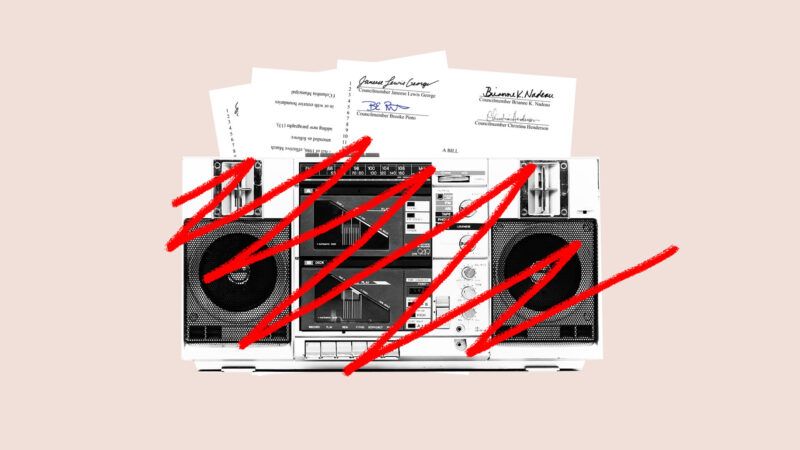D.C. City Council Considers Soundproofing Requirement for Residential Construction To Appease NIMBYs
The Harmonious Living Amendment Act improves on past proposals to fine street musicians. It still suffers from all the typical problems that come with top-down regulation.

Local politicians in Washington, D.C., are choosing to involve themselves in a conflict between tradition and newcomers that could easily solve itself.
In response to mounting complaints from new District residents about loud street music seeping into their homes, several members of the city council have introduced legislation that requires developers to include noise-canceling designs in apartments built near music venues and other hubs of sound-producing activity.
"This legislation seeks to address the rising tension that we are seeing between performers and neighbors who live in buildings or homes that are not adequately soundproofed," said Councilmember Brianne Nadeau of her Harmonious Living Amendment Act of 2021, which was introduced last week. "The District is a dynamic city with a rich musical heritage and I believe this bill is a path forward to finding harmony."
Councilmembers Christina Henderson, Janeese Lewis George, and Brooke Pinto are also sponsoring the legislation.
Nadeau's bill, DCist reports, is being offered as an alternative to a more punitive proposal, the Amplified Noise Amendment Act, which was first floated in 2018, and would have fined people $300 for playing amplified music in public that could be heard beyond 100 feet.
That proposal sparked a stiff backlash from street performers who saw the bill, and the fines contained within it, as an attempt to squash traditional D.C. culture for the benefit of overly sensitive newcomers.
"This will push music out of the District," musician and community organizer Aaron Myers told DCist at the time. "Music is a very important part of the community. People want to get off the Metro and hear music."
Controversy flared up again in 2019 when a noise complaint from a neighbor forced a Metro PCS storefront to stop playing the go-go music it'd been blasting without incident for decades.
The music eventually returned, but only after a viral #dontmutedc campaign on social media and the intervention from the T-Mobile CEO himself (the company owns Metro PCS).
That episode helped kill the Amplified Noise Amendment Act, but underlying tensions continued to simmer.
Enter Nadeau's proposal. Beginning in January 2022, her Harmonious Living Amendment Act requires that all residential construction on parcels abutting "activity areas"—defined as parcels zoned for particular types of mixed uses— incorporate design features that reduce sound levels below specific decibel targets.
The bill also includes sound-reduction design requirements for residential construction in "entertainment areas," defined as parcels with exterior boundaries within 300 feet of an entertainment venue.
Lease or purchase agreements for existing residential units within those areas would have to include notifications about nearby entertainment venues as well as descriptions of the sound reduction measures the building has in place.
The bill would create a grant program to incentivize music venues to install noise mitigation measures. Property owners would also get tax breaks for soundproofing their buildings.
Nadeau says in a press release that her bill is informed by the "agent of change" principle that London incorporated into its planning code after a large number of music venues there were closed down by noise complaints from the residents of new apartments. This basically adopts a first-come, first-served rule for determining who should have to bear the costs of noise mitigation.
The policy, as explained by the London mayor's office, requires the city's boroughs to consider refusing proposals for new residential development near existing entertainment venues that don't incorporate soundproofing features. On the flipside, buildings that are converted to music venues or other loud uses near existing residential areas are required to adopt noise mitigation measures.
As far as social expectations go, putting the onus on newcomers to acclimate themselves to local norms is entirely reasonable. Witness the justified outrage when a local tourism board suggested in 2019 that D.C. locals adopt the irritating tourist habit of standing on the left side of Metro escalators.
But imposing such a norm via regulation creates all the problems that top-down solutions typically do. Balancing people's desires for making noise versus their tolerance for hearing it can easily be done through the price mechanism.
Soundproofing new residential units, as Nadeau's bill would require, will obviously raise the costs of those units. Tenants who'd gladly accept a little more noise—and a lower price to live next to bustling commercial areas—will instead be forced to pay for a benefit they don't really want.
Developers will either have a harder time filling up buildings made more expensive by regulation or alternatively have to accept less profit renting out soundproofed units that no one was ready to pay for. Either way, their incentive to create more housing in an already expensive city is marginally reduced.
If there really is a market demand for quiet, insulated units in noisy areas, then builders need no government encouragement to soundproof.
There would be some amount of schadenfreude in seeing Nadeau's bill pass. People who moved into a major city famous for its amplified street music would have their petty noise complaints rebound on them in the form of higher rents.
But that would be a shameful joy for a reason. The solution to overly sensitive newcomers isn't to placate their complaints with coercive regulation. Rather, it should be to foster a more tolerant atmosphere of the sounds, sights, and, yes, even smells of the city through voluntary means.
People who are still bothered by hearing go-go music can seek out apartments in quieter parts of the city, or seek out pricier units that come with the soundproofing they demand. If that proves too expensive, there's always the option of decamping to Arlington.
Rent Free is a weekly newsletter from Christian Britschgi on urbanism and the fight for less regulation, more housing, more property rights, and more freedom in America's cities.


Show Comments (20)